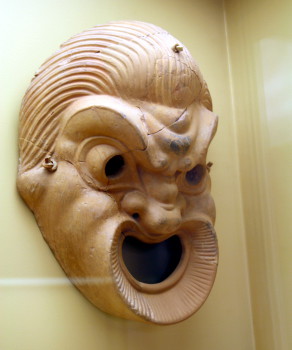Ancient Worlds: Greek Comedy and the Surprising Origins of SFF
 Laughter is one of the defining traits of higher primates, ourselves included. While I’m pretty sure my dog can grin, I have yet to hear him giggle. His attempts at humor are pretty weak, too. But for those of us in the opposable thumbs club, humor is a near-universal. What makes someone laugh may vary from culture to culture and across time, but our love of laughter is a constant.
Laughter is one of the defining traits of higher primates, ourselves included. While I’m pretty sure my dog can grin, I have yet to hear him giggle. His attempts at humor are pretty weak, too. But for those of us in the opposable thumbs club, humor is a near-universal. What makes someone laugh may vary from culture to culture and across time, but our love of laughter is a constant.
This was as true of the Ancient Athenians as it is of us. Our word, comedy, is in fact a Greek word that contains the ideas of partying or festival-going and poetry. And the Greeks loved comedy. Today I want to talk specifically about Old Comedy, which you probably know (if you know it at all) from the works of Aristophanes.
Aristophanes would have gotten along well with Jon Stewart. Old Comedy was highly topical: it was deeply political, satirical, and fond of poking fun at the powerful. It made use of mythological themes and characters, but unlike our surviving tragedies usually took place in a relatively modern, if highly fanciful, setting. The plots were absolutely ludicrous, and the jokes made pointed reference to contemporary politics. So much so that, should you choose to read any old comedy (and you should: it’s worth the effort), I’m going to break with my usual custom and suggest you get a highly annotated, solid, scholarly edition to do so. In most genres, I advise people to go with readability. But with Aristophanes, you’ll need the footnote that explains that a certain individual was famous for his blowjobs rather than his active performance for anal sex if you want to get the joke in the backyard scene of Ecclesiazusae.
Did I mention that Athenians liked their comedy dirty? The scene in question involves two men, both forced to wear their wives’ clothes because said wives have stolen their husband’s clothing in order to sneak into the Assembly, running into each other when they go out to take their morning shit. Mortification and constipation ensue, and the tone of the piece really doesn’t rise at any point, travelling through jokes scatological, sexual, and heretical.
The gist of Ecclesiazusae (or “The Assemblywomen”) is this: the women of Athens, thoroughly fed up by how the men have been running the place, decide to take over. To do this they dress up as men, sneak into the Assembly early in the morning, and vote through the measure of turning over control of the city to its women. Now in charge, the women abolish private property, institute a socialist welfare state, and set up a system by which men can have sex with any women they want once they service the old and ugly ones first.
But is it funny? I think so. Moments of it are downright hilarious, even if the overall plot doesn’t hold together well. It got big laughs when we did it in Southern Indiana, which is saying something. (It may have helped that we had a member of the City Council playing the female lead.) And someone thought it was worth preserving for a good 2400 years.
All well and good, I hear you say, but why are we discussing it here, at Black Gate?
Because comedy, and this kind of comedy specifically, is the first time we really see the active, deliberate, and open creation of a fantasy world in literature. Think about that for a moment. The Odyssey reads as fantasy to us, certainly, but ancient writers regularly tried to track Odysseus’ journey on an actual map. The Epic of Gilgamesh was regarded as history. Tragedies were works of mythic retelling, and fell into a kind of gauzy world in between religious works and histories. But the comedies are pure invention, and they don’t pretend to be anything else.
In the Assemblywomen, it’s the idea that women could take over the state so easily and institute such sweeping change literally overnight. Next week, with The Birds, we’ll discuss the invention of an entire world.
The first time I saw South Park, I recognized it immediately as Aristophanic. The episode about Mr. Hanky the Christmas Poo was, taken on its own terms, so unappealing to me, I transposed it in my head into the traditional choreography of the Dionysia and felt much better. Aristophanes would especially have enjoyed the movie South Park: Bigger, Longer, & Uncut.
Alas, I have not read (nor seen, worse luck) The Ecclesiazusae. I guess I know what my homework assignment is.
And Aristophanes is just an endless source of amusement, not discounting his “appearance” in tv’s Odd Couple with their Password episode: “Aristophanes?? That’s ridiculous!!”
“The password is: Ridiculous”
“Aristophanes!”
“What?”
“ARISTOPHANES!!”
“… ridiculous??”
*Ding, ding, ding*
“It’s our all-purpose clue.”